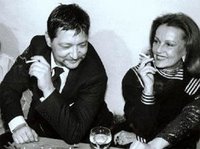No commune without a leader?

This is transcribed from a documentary included among the supplementary matter for the BDR Trilogy (comprising of The Marriage of Maria Braun, Veronika Voss, and Lola) DVD Box Set produced by those good people at the Criterion. The title of the documentary is I don't just want you to love me and it is directed by Hans Gunther Pflaum. The following is Fassbinder speaking to and away from the camera, chain smoking, and feeling deeply disturbed by the experience. The picture to the left is him (in a more animated moment) with, of course, Jeanne Moreau.
[NB. The inner quote is from an inserted footage and again it is Fassbinder who speaks and responds to the question: "A commune?" ]
"Working on a film or in a theater, for example, the atmosphere that’s created, the complications, getting to know each other or not getting to know each other—all that may have a lot to do with how I lived as small child. Sure. I can only say, and I’ve said it before, that I prefer that to being fixated on one or two or three people. I’m very glad that I had this strange, non-parental home life.
[…]
"There was only the desire, widely held among various people at the time for a group, for a new form of cooperation, and cohabitation, and so on. We tried in our way to put into practice what others had tried in their own way. For a long time we pretended to be a group even when it was clear to us we weren’t one. Perhaps, too, we thought—to return to what you said earlier—if we say again and again that we’re a group, perhaps we’ll become one. But that doesn’t work. Simply saying so doesn’t make it reality.
--It was our goal from the start to become a collective—the kind of collective with which we began the Action Theater. We would produce theater, but above all we would live together.
--A commune?
--Yes, a commune. That was our goal, but it became increasingly apparent that it wasn’t attainable.
"I’d say that I grew up in such a way that I don’t need a leader and don’t need to be one either. I have been around many people who were ultimately looking for a father or a mother, and, well-- Initially, I think I went along with that because I thought it was a transitional phase. Eventually, I realized it wasn’t a transitional phase, that maybe it was just the role I was supposed to play. That’s regrettable, but it’s a social phenomenon that we couldn’t escape, just like everybody else. You would have to start out differently. The education of the individual, or the education we all received would need to be different so that we no longer needed a leader. We aren’t there yet. Our upbringing is different, so we can’t have a group without a leader."

1 Comments:
dear ymM,
(Is the second M a symbol of certain political stance a la "bell hooks" or a typo that's accidentally caught on?)
rather than "no commune without a leader?", i read RWF to be saying a commune cannot form or sustain itself with a leader, or to be more precise, while deep down still yearning for a maternal/paternal figure to look up to. much like lacan's dismissal of the uprising university students during the sixties: "As revolutionaries, you long for a (new) master. And you'll get one". [RWF comes across as the more humble of the two megalomaniacs]. going back to the title, that's why i thought "no commune with a leader?" or "commune without a leader?" would be a more accurate way of putting it. no community without nitpicking, i suppose : )
3:55 PM
Post a Comment
<< Home